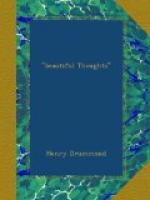May 21st. Do not spoil your life at the outset with unworthy and impoverishing correspondences; and if it is growing truly rich and abundant, be very jealous of ever diluting its high eternal quality with anything of earth. Natural Law, Mortification, p. 196.
May 22d. To concentrate upon a few great correspondences, to oppose to the death the perpetual petty larceny of our life by trifles—these are the conditions for the highest and happiest life. . . . The penalty of evading self-denial also is just that we get the lesser instead of the larger good. The punishment of sin is inseparably bound up with itself. Natural Law, Mortification, p. 196.
May 23d. Each man has only a certain amount of life, of time, of attention—a definite measurable quantity. If he gives any of it to this life solely it is wasted. Therefore Christ says, Hate life, limit life, lest you steal your love for it from something that deserves it more. Natural Law, Mortification, p. 197.
May 24th. To refuse to deny one’s self is just to be left with the self undented. When the balance of life is struck, the self will be found still there. The discipline of life was meant to destroy this self, but that discipline having been evaded—and we all to some extent have opportunities, and too often exercise them, of taking the narrow path by the shortest cuts—its purpose is baulked. But the soul is the loser. In seeking to gain its life it has really lost it. Natural Law, Mortification, p. 196.
May 25th. Suppose we deliberately made up our minds as to what things we were henceforth to allow to become our life? Suppose we selected a given area of our environment and determined once for all that our correspondences should go to that alone, fencing in this area all round with a morally impassable wall? True, to others, we should seem to live a poorer life; they would see that our environment was circumscribed, and call us narrow because it was narrow. But, well-chosen, this limited life would be really the fullest life; it would be rich in the highest and worthiest, and poor in the smallest and basest, correspondences. Natural Law, Mortification, p. 199.
May 26th. The well-defined spiritual life is not only the highest life, but it is also the most easily lived. The whole cross is more easily carried than the half. It is the man who tries to make the best of both worlds who makes nothing of either. And he who seeks to serve two masters misses the benediction of both. Natural Law, Mortification, p. 199.
May 27th. You will find, as you look back upon your life, that the moments that stand out, the moments when you have really lived, are the moments when you have done things in a spirit of love. As memory scans the past, above and beyond all the transitory pleasures of life, there leap forward those supreme hours when you have been enabled to do unnoticed kindnesses to those round about you, things too trifling to speak about, but which you feel have entered into your eternal life. The Greatest Thing in the World, p. 60.




